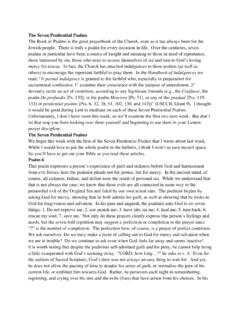Transcription of Spiritual and Corporal Works of Mercy - //www.hscc.us
1 Spiritual and Corporal Works of Mercy Spiritual Works of Mercy Corporal Works of Mercy 1. To admonish the sinner. 1. To feed the hungry. 2. To instruct the ignorant. 2. To give drink to the thirsty. 3. To counsel the doubtful. 3. To clothe the naked. 4. To comfort the sorrowful. 4. To visit the imprisoned. 5. To bear wrongs patiently. 5. To shelter the homeless. 6. To forgive all injuries. 6. To visit the sick. 7. To pray for the living and the dead. 7. To bury the dead. The Spiritual and Corporal Works of Mercy are charitable actions by which we come to the aid of our neighbor in his Spiritual and bodily necessities. Instructing, advising, consoling, comforting are Spiritual Works of Mercy , as are forgiving and bearing wrongs patiently.
2 The Corporal Works of Mercy consist especially in feeding the hungry sheltering the homeless, clothing the naked, visiting the sick and imprisoned and burying the dead. Among all these, giving alms (money) to the poor is one of the chief witnesses to fraternal charity (brotherly love); it is also a work of justice pleasing to God. The Spiritual and Corporal Works of Mercy seek to help alleviate human misery material deprivation, unjust oppression, physical and psychological illness and death. Such misery is an obvious sign of our inherited human frailty and need for salvation as a consequence of original sin.
3 Everyone is obliged to perform the Works of Mercy , according to his own ability and the need of his neighbor. It is important to remember that ordinary deeds done every day to relieve the Corporal or Spiritual needs of others are true Works of Mercy , if done in the name of Christ. Taking care of children, teaching children and adults about the faith, caring for elderly parents or a sick child or spouse are some examples. Spiritual Works of Mercy 1. To admonish the sinner. It is an act of love to try to make another realize how bad sin is. This might be done by trying to keep him out of sin or an occasion of sin, or by trying to get him to confession.
4 In cases where we think it might make him worse, we do not correct him directly. We can let him know indirectly, especially by our example, that we do not approve of his actions. 2. To instruct the ignorant. It is an act of love to help others in one way or another to learn the truths they need to know to save their souls. 3. To counsel the doubtful. It is an act of love to help others to be certain about what they should do to love and serve God. Many souls could be saved if Catholics would make the effort to speak the truth in love to their neighbors. 4. To comfort the sorrowful. It is an act of love to help another person in any kind of sorrow, and to refrain from doing anything that would unnecessarily cause another person more sorrow.
5 5. To bear wrongs patiently. It is an act of love to accept the consequences of another s thoughtlessness or carelessness and to suffer inconveniences which another should bear. This is the example given to us by Jesus who suffered greatly for us all when he was innocent. 6. To forgive all injuries. It is an act of deep love to forgive all those who have injured us in any way, even deliberately and with malice. Christ demands that His followers have great love and forgiveness for one another and even for our enemies in imitation of His own forgiveness of us and of His enemies as He hung on the cross.
6 In His almighty wisdom, God knows that failing to forgive causes further injury to the person originally injured. 7. To pray for the living and the dead. Sharing in the communion of saints demands that we pray for everyone. This is a great means of spreading the fires of love to others, whether in this world or in purgatory. Prayers for the dead at a cemetery carry special graces. Corporal Works of Mercy 1. To feed the hungry. Everyone needs food for their body. It is an act of love to help others to obtain their bodily nourishment, especially those in greatest need. [Examples: Bringing food to the poor, donating money to buy food for the poor, sharing your food or candy, helping to shop for groceries, helping with the cooking, doing dishes, waiting on company.]
7 ] 2. To give drink to the thirsty. What is said of food also applies to drink. [Examples: Giving someone a drink on a hot day, giving the baby its bottle, pouring drinks at the table, lifting up a young child to get a drink at a water fountain.] 3. To clothe the naked. Everyone needs clothing for warmth, protection, modesty and dignity. It is an act of love to help others obtain clothing, especially those who need help. [Examples: Bringing clothes to a needy family, sharing outgrown clothes with another family, bringing clothes to a clothing drive, helping a young child get dressed, helping with laundry at home.
8 ] 4. To visit the imprisoned. Those in prison and many other persons and their families suffer hindrances or dangers to freedom. Helping them, visiting them or protecting them is an act of love. [Examples: Visiting prisoners, fighting for humane treatment for the imprisoned, helping to care for the families of the imprisoned, protecting a little child from a bigger child, taking care of and protecting the baby, fighting for one s country.] 5. To shelter the homeless. Everyone needs shelter. Some people live in cardboard homes; some people live in homes made of discarded materials; many people are homeless.
9 To help the homeless obtain shelter or to preserve it is an act of love. [Examples: Bringing others to your home in times of fire, floods, or other disaster. Working at or supporting a homeless shelter. Helping to take care of the house, dusting the furniture, making the beds, cleaning the floor, and cutting the grass.] 6. To visit the sick. Helping sick people in any way is an act of love. [Examples: Visiting someone in the hospital or nursing home. Visiting someone who is sick at home or the elderly who are shut-ins. Running an errand for an elderly or sick person.]
10 Reading to the sick or elderly.] 7. To bury the dead. It is an act of love to show respect for the bodies of the dead, since during life, they were temples of the Holy Spirit and received the Body and Blood of Christ in Holy Communion. [Examples: Going to funerals and wakes. Treating cemeteries with respect. Cutting the grass on a grave. Putting flowers on it.] References 1) Catechism of the Catholic Church, Libreria Editrice Vaticana, 1994, pp. 558. 2) Saint Joseph Baltimore Catechism, Official Revised Edition, No. 2, Catholic Book Publishing Co., New York, 1962, pp.








